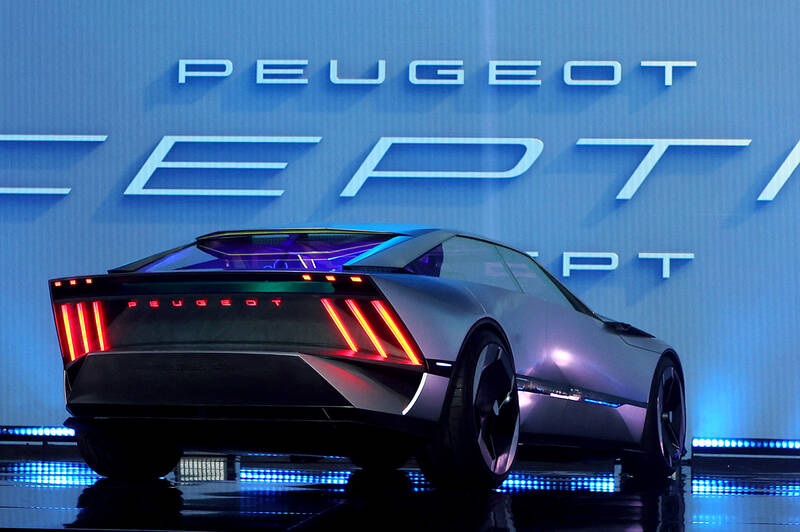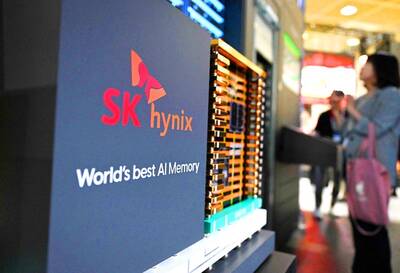Stellantis NV might idle additional auto manufacturing plants as it grapples with higher inflation on top of the cost of electrifying its lineup, chief executive officer Carlos Tavares said on Thursday.
“If we don’t optimize our cost structure, we cannot absorb the additional cost of electrification,” which risks leading to elevated prices and a shrinking market, Tavares told reporters in Las Vegas for the Consumer Electronics Show. “If the market shrinks, we don’t need so many plants. Some unpopular decisions will have to be made.”
The Netherlands-headquartered automaker last month said that it would idle a Jeep-making factory in Belvidere, Illinois, effective on Feb. 28, which would result in layoffs of an unspecified number of workers.

Photo: AFP
Still, should demand rebound, Stellantis might “adapt” its decision on that plant, Tavares said.
Automakers are already feeling the pinch of spiraling inflation, which is holding back some buyers even as semiconductor shortages that dogged the industry in the aftermath of the COVID-19 pandemic started easing.
In Europe, Volkswagen AG last month said that this year would likely be “even more challenging” than last year as demand is restricted amid high inflation and a worsening economic outlook.
An environment of higher interest rates, rising inflation and other economic headwinds has also begun to affect automakers outside of Europe.
Tesla Inc earlier this week reported a third straight deliveries miss despite offering hefty incentives in its biggest markets, while the CEO of Chinese electric automaker Nio Inc (蔚來汽車) has warned of a challenging first half.
Stellantis has no choice but to keep slashing its fixed, variable and distribution expenses to stay competitive and to make EVs more affordable for the middle classes, Tavares said, adding: “You go from hero to zero in three years if you stop working on costs.”
“It doesn’t always make us very popular, but it’s the right thing to do,” he said. “If you keep for a significant amount of time capacity that you don’t use, you put yourself in trouble. You need to continuously adapt your capacity to your needs.”
Tavares also is still considering whether to stop manufacturing vehicles altogether in China, the world’s biggest auto market.
Stellantis is continuing talks with its Chinese partner for Peugeot and Citroen vehicles because remaining in China “with an asset heavy presence would represent a major risk” should geopolitical tensions with the West escalate.
“The talks are difficult, they are respectful and they are not finished,” Tavares said.
Stellantis might implement an “asset-light” strategy for those brands in China, he said.
Earlier this year, Tavares used the same phrase to describe a decision to pull out from the company’s only Jeep plant in Asia’s largest economy.

Intel Corp chief executive officer Lip-Bu Tan (陳立武) is expected to meet with Taiwanese suppliers next month in conjunction with the opening of the Computex Taipei trade show, supply chain sources said on Monday. The visit, the first for Tan to Taiwan since assuming his new post last month, would be aimed at enhancing Intel’s ties with suppliers in Taiwan as he attempts to help turn around the struggling US chipmaker, the sources said. Tan is to hold a banquet to celebrate Intel’s 40-year presence in Taiwan before Computex opens on May 20 and invite dozens of Taiwanese suppliers to exchange views

Application-specific integrated circuit designer Faraday Technology Corp (智原) yesterday said that although revenue this quarter would decline 30 percent from last quarter, it retained its full-year forecast of revenue growth of 100 percent. The company attributed the quarterly drop to a slowdown in customers’ production of chips using Faraday’s advanced packaging technology. The company is still confident about its revenue growth this year, given its strong “design-win” — or the projects it won to help customers design their chips, Faraday president Steve Wang (王國雍) told an online earnings conference. “The design-win this year is better than we expected. We believe we will win

Power supply and electronic components maker Delta Electronics Inc (台達電) yesterday said it plans to ship its new 1 megawatt charging systems for electric trucks and buses in the first half of next year at the earliest. The new charging piles, which deliver up to 1 megawatt of charging power, are designed for heavy-duty electric vehicles, and support a maximum current of 1,500 amperes and output of 1,250 volts, Delta said in a news release. “If everything goes smoothly, we could begin shipping those new charging systems as early as in the first half of next year,” a company official said. The new

SK Hynix Inc warned of increased volatility in the second half of this year despite resilient demand for artificial intelligence (AI) memory chips from big tech providers, reflecting the uncertainty surrounding US tariffs. The company reported a better-than-projected 158 percent jump in March-quarter operating income, propelled in part by stockpiling ahead of US President Donald Trump’s tariffs. SK Hynix stuck with a forecast for a doubling in demand for the high-bandwidth memory (HBM) essential to Nvidia Corp’s AI accelerators, which in turn drive giant data centers built by the likes of Microsoft Corp and Amazon.com Inc. That SK Hynix is maintaining its